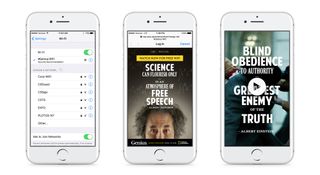
Genius Bot: Chat with 'Einstein' Via Facebook Messenger

On April 25, National Geographic Channel will launch its first scripted television show, "Genius," about the life of Albert Einstein. But before that happens, the channel is also planning for the famed scientist to make an appearance — of sorts — just in time for the March for Science this weekend in Washington, D.C.
A chatbot on Facebook Messenger allows users to engage in a text exchange with "Albert Einstein," exploring details of his life and accomplishments, and discovering his perspective on the March for Science, which is taking place in the nation's capital (and elsewhere across the globe) on April 22. [2017 March for Science: What You Need to Know]
A sample conversation shows the chatbot replying to questions, making jokes about Einstein's hair, and sharing a GIF of Einstein (played by actor Geoffrey Rush in the television show) turning to the camera and sticking out his tongue.
The real-life Einstein would likely have supported the march, which invites scientists and nonscientists alike to rally in a show of support for the sciences. In Einstein's famous essay "The Common Language of Science" — recorded in 1941 as a radio address to the British Association for the Advancement of Science, and published in 1954 in an anthology of his writings called "Ideas and Opinions" — he described science as a shared language that plays an important role in shaping critical goals for the benefit of people and nations around the world.
National Geographic is installing a free Wi-Fi network for March for Science participants, which they can access after viewing short scenes from the "Genius," as well as a "Genius"-themed tent that offers charging stations and provides a sneak peek of footage from upcoming episodes.
Connect with the Einstein chatbot on Facebook Messenger.
Original article on Live Science.
Sign up for the Live Science daily newsletter now
Get the world’s most fascinating discoveries delivered straight to your inbox.

Mindy Weisberger is an editor at Scholastic and a former Live Science channel editor and senior writer. She has reported on general science, covering climate change, paleontology, biology, and space. Mindy studied film at Columbia University; prior to Live Science she produced, wrote and directed media for the American Museum of Natural History in New York City. Her videos about dinosaurs, astrophysics, biodiversity and evolution appear in museums and science centers worldwide, earning awards such as the CINE Golden Eagle and the Communicator Award of Excellence. Her writing has also appeared in Scientific American, The Washington Post and How It Works Magazine.
Most Popular

